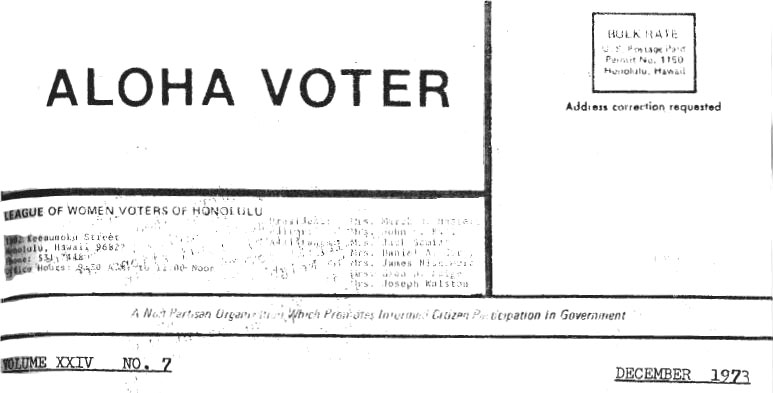 November 1973
November 1973December 1973
 January 1974
January 1974 November 1973 November 1973 |
Home
Newsletters
December 1973 |  January 1974 January 1974 |

 What Does it Really Take to Be Elected? What Does it Really Take to Be Elected? From the President (Diane Hastert) From the President (Diane Hastert) December Calendar December Calendar Money Bag Money Bag Board Bulletin Board Bulletin Learn to Lobby Wrap-up Learn to Lobby Wrap-up League Pulse League Pulse Summary of Memo from Lucy Wilson Benson, National President (Lucy Wilson Benson) Summary of Memo from Lucy Wilson Benson, National President (Lucy Wilson Benson) International Relations and Trade (Barbara Wiebenga) International Relations and Trade (Barbara Wiebenga) Multinationals (Barbara Wiebenga) Multinationals (Barbara Wiebenga) Whatever Happened to the Capitol Guide Service? (Gretel McLane) Whatever Happened to the Capitol Guide Service? (Gretel McLane) Water Pollution Control Water Pollution Control Report from the Hill Report from the Hill Action Alley Action Alley |
Report from the HillA digest of Congressional activity of LWV interest STRIP MINING Senate passed S 425 by a vote of 82 to 8, one of a few major environmental issues acted on in this session to date. The bill proposes to regulate coal surface mining on all federal and non-federal lands by establishing a federal-state program: the federal government has responsibility for promulgating uniform minimum standards for state programs and for protecting federal lands. Although the bill does not even begin to phase out strip mining, it does prohibit mining in areas where (a) reclamation is not possible; (b) mining would be incompatible with existing land use programs, (c) mining is in an area of critical environmental concern. LWV considers the bill a major step in the right direction; action an stricter House legislation is not expected until 1974. LAND USE The Senate passed "The Land Use Policy and Planning Assistance Act of 1973"--S 268--in June by a vote of 64 to 21. The House Subcommittee on Environment reported HR 10294, "The Land Use Planning Act of 1973" in September, but the full Committee on Interior and Insular Affairs, James Haley (D FL) Chairman has slowed down its markup of the bill because of letters of protest from Chamber of Commerce chapters and developers. The Committee is not hearing from environmentalists who are supporting the bill. ESEA House Education and Labor Committee is expected to complete markup of HR 69 by Thanksgiving; Administration makes conciliatory moves, agreeing to tentative committee plans to consolidate certain ESEA programs (not Title I) instead of insisting on education revenue sharing. The Administration promises an extra $540 million in federal education funds IF the committee will agree also to phase out "B" impact aid for students whose parents do not live an federal installations and to consolidate vocational education programs. The Senate Subcommittee on Education Claiborne. Pell (D RI) Chairman, continues periodic hearings on the Pell bill--S 1539 and a new bill--S 2414- -by Mondale (D MN). Both bills extend current ESEA programs but also provide other types of federal grant aid to equalize inequities in education expenditures, LEGAL SERVICES The Senate Education and Labor Committee may have reported a new legal services bill by the time you receive this R/H. A preliminary summary of the bill indicated likelihood of a much better bill than House-passed measure—i.e., it is closer to the House Committee bill which we supported (See R/H no. 93-14, 6/22/73). It is absolutely necessary to pass a very good Senate bill to be able to bargain in Conference for successful deletion of the House restrictions on poverty clients, legal service lawyers and backup research centers. Please let your Senators know of your support for the best possible legal services legislation. UNITED NATIONS League joins 111 nongovernmental organizations in reaffirming dedication to the goals of development and support for UN programs to improve social and economic conditions in low-income countries. ABSENTEE VOTING FOR U.S. CITIZENS ABROAD Bills have been introduced in both branches to establish uniform voting in federal elections for U.S. citizens residing abroad; S 2102 by Sen. Mathias,(R MD) and S 2384 by Sen. Pell (D RI) and HR 9023, by Rep. Railsback (R RI). Citizens would be allowed to vote absentee in states where they last resided or registered; states would have to establish uniform registration deadlines and absentee ballot procedures to conform with the 1970 Voting Right Act, etc. Write your Members of Congress for bill copies. A NOTE ON NOMENCLATURE Technically, it is correct to call all Senators and Representatives in Congress
"Congressmen" or "Congresswomen," In practice, Senate Members prefer to be called "Senators" and Representatives prefer to be called "Congressmen" (-women, or -people.) When it is appropriate to contact both, we will refer in R/H and T/A to Members of Congress--thus avoiding the sex hassle. We will distinguish between the two branches by designating Members as Senators or House Members when it is appropriate to contact one or the other.
|
 November 1973 November 1973 | Top Home Newsletters |  January 1974 January 1974 |